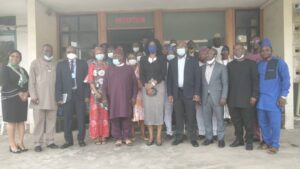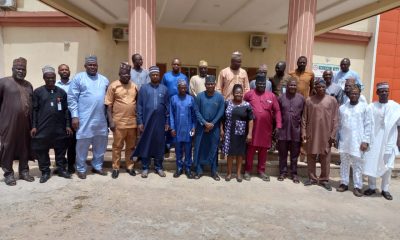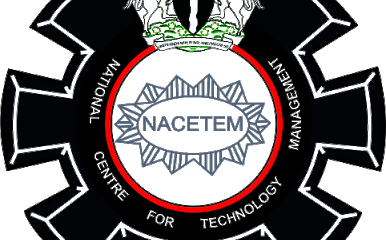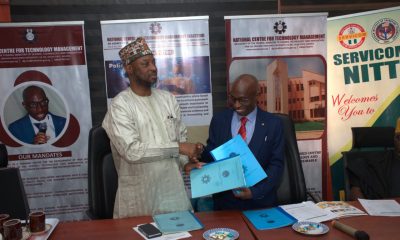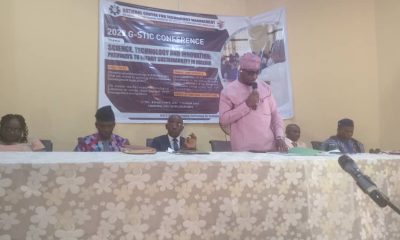News
Low Innovation Critical Barrier To Nation Development- NACETEM DG
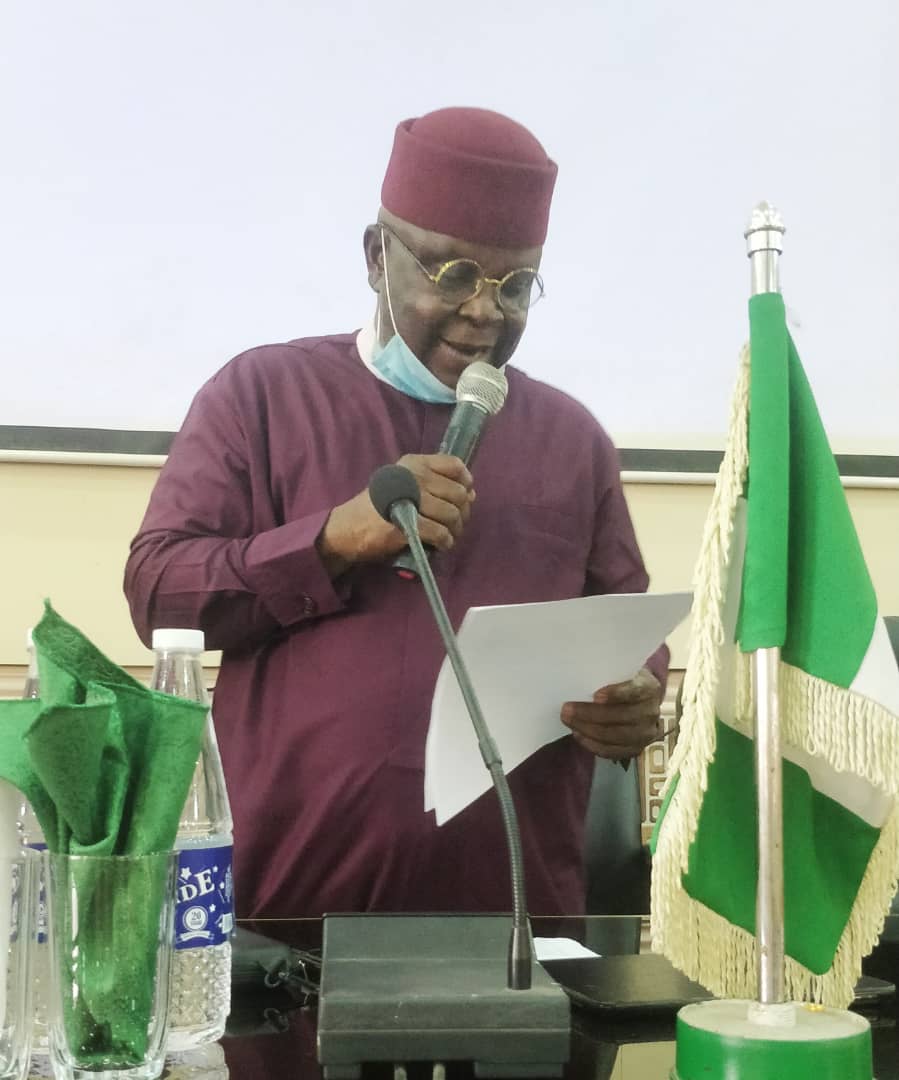
The Director-general and Chief Executive Officer, National Centre for Technology Management (NACETEM), Engr Prof Okechukwu Ukwuoma, has identified low innovation as a critical barrier to the development of a country.
He emphasized the potential gains from innovation in terms of boosting incomes, jobs, and economic growth, adding that innovation is a major driver of economic development of any country, hence , the need to embrace innovation in formal sector .
Prof Ukwuoma made this known while making his opening remarks at the workshop on the dissemination of outcomes of the National Business Innovation Survey 2020 held at the Federal Institute Of Industrial Research Oshodi (FIIRO), Lagos.
The NACETEM DG said science and technology can only have meaningful impact on socio-economic transformation of countries if it can influence the processes of development and bringing of new products to the market.
He explained that the government base on this fact had realized the importance of developing indicators to measure innovation in firms on a consistent basis, particularly the formal sector.

Director-general and Chief Executive Officer, National Centre for Technology Management (NACETEM), Engr Prof Okechukwu Ukwuoma
Read the full text below:
Protocol
I am pleased to give this opening remarks and welcome everyone to this momentous workshop organized by the National Centre for Technology Management (NACETEM) to disseminate the outcomes of the third National Business Innovation Survey (NBIS) undertaken to measure the state of innovation in Nigeria’s manufacturing and service sectors.
It is generally believed that innovation is a major driver of economic development of any country. Science and technology can only have meaningful impact on socio-economic transformation of countries if it can influence the processes of development and bringing of new products to the market. For this reason, governments globally realize the importance of developing indicators to measure innovation in firms on a consistent basis, particularly the formal sector.
Distinguished audience, let me say here that the significance and immense contributions of the formal sector to the Nigerian economy stimulated the interest of the Agency to beam its searchlight on the significance of innovation in the sector. This is because experts agree that the formal sector is much more productive than the informal sector; indeed, formal sector earnings are about 70% higher than those of the informal sector though it employs only about 20% of all persons working in the private sector.
In Nigeria, NACETEM, an agency of the Federal Ministry of Science and Technology, is mandated to regularly conduct Innovation Surveys on behalf of the Federal Government on a time series basis. The strategic position of NACETEM as the think tank of government on issues of science, technology and innovation (STI) management empowers her to regularly undertake the survey. This is encapsulated in one of the mandates of the Agency, which is to “establish, maintain and provide access to STI research outputs and facilitate activities towards their commercial exploitation.”
In exercise of this mandate, NACETEM had in 2005 conducted the first innovation study which focused on the manufacturing sector only. However, in 2006, it initiated the development of science, technology and innovation (STI) indicators project for Nigeria, leading to the conduct of the first National Innovation Survey 2011. Other surveys in the project include the Research and Experimental Development (R&D) Survey as well as the Innovation Survey in the Informal Sector, undertaken in partnership with the Centre for Science, Technology and Innovation Indicators (CeSTII), HSRC, South Africa. The data we are disseminating today represents the outcome of the third Innovation Survey, titled, the National Business Innovation Survey 2020. This NBIS 2020, which covered the 3-year period between 2016 and 2018, represents the third in the series of innovation surveys among business enterprises in Nigeria after the National Innovation Survey 2011 (which covered 2005 – 2007) and the National Innovation Survey 2013 (which covered 2008 – 2010). Some of the indicators developed under the NBIS are types of innovation in the sector, innovation activities, sources of information for innovation, objectives of innovation, innovation and ICTs, barriers to innovation, among others.
The overall goal of collecting innovation indicators is to provide empirical evidence that will assist government in making policies that can enhance the capacity of firms to implement new products and services. The experience of successful developing countries shows that integrating STI policies into national development strategies in addition to enacting far reaching institutional reforms offers the pathway for increased productivity and firm competitiveness, as well as supporting faster economic growth and job creation. To achieve this in developing countries, policies need to address specific issues that have hindered the implementation of innovation in firms. These include weak absorptive capacity of firms to identify, acquire and adapt foreign innovations, weak industry-academia linkage, inability to refocus foreign direct investment and technology transfer to stimulate innovation, limited access of firms to skilled workers and to capital, weak technology-related infrastructure and inadequate intellectual property rights regimes. One of the ways this can be tackled is by regularly developing indicators on a time series basis with the aim of assisting in evaluating the performance of the innovation system in Nigeria, track progress and make projections for future trajectory of the system. This will assist in strategic planning and monitoring the state of innovativeness and competitiveness of Nigerian firms.
This STI Indicators project in Nigeria was initiated into the Africa Science, Technology and Innovation Indicators Initiative (ASTII) of the then New Partnership for African Development Office of Science and Technology (NEPAD OST) in 2008. The NEPAD ASTII had its origin from the first African Ministerial Council on Science and Technology (AMCOST) meeting in Johannesburg, 2003 which resolved to, ‘Develop and adopt common sets of indicators to benchmark our national and regional systems of innovation’. This commitment, among others, led to the adoption of the Consolidated Plan of Action (CPA), the STI programme of action for the continent in the AMCOST II meeting held at Dakar in 2005. The first phase of the ASTII project which took place in 19 African countries was successfully completed with the production and release of the African innovation outlook (AIO) in May, 2011. Since then, two other AIOs have been published. The indicators in the NBIS 2020 will form Nigeria’s input into the next AIO (AFRILOOK) to be published by the African Union Development Agency-NEPAD (AUDA-NEPAD). It will also form Nigeria’s inputs into other regional and global databanks of STI such as the AU – African Observatory on Science, Technology and Innovation (AOSTI), the UNESCO Institute of Statistics, WIPO Global Innovation Index, among others.
It needs to be stressed that this workshop is not an end in itself, but a means to an end. The ultimate aim is to use evidence in the NBIS to influence government policy in driving innovation and competitiveness in Nigeria business sector. That is why the role of the National Bureau of Statistics (NBS) in supporting this NBIS and other surveys in the STI Indicators project is important. We also appreciate the role of our parent Ministry, the Federal Ministry of Science and Technology (FMST) in this regard.
It is also important at this juncture to mention one of the major challenges we face in the process of undertaking the NBIS – the challenge of completing our questionnaire by the business community. I therefore seek the support of the industry association leaders in completing the questionnaire for future exercises. NACETEM will work closer with the different associations in this regard.
Distinguished audience, I want to express the gratitude of NACETEM to all the invited stakeholders for honouring our invitation. These include representatives from the business sector (NECA, NACCIMA, LCCI, MAN, NASME and NASSI), representatives from government (FMST), the academia, the banking industry, development partners, UNIDO, the NBS, among others. Without the stakeholders at this workshop, our gathering here would have been impossible! This has really bolstered my confidence that this workshop will be a huge success and I am convinced that we are on the right track in bringing about the much-desired change the current government wants for the country.
While I welcome you heartily to the Federal Institute of Industrial Research Oshodi (FIIRO), a sister Agency that has graciously opened its door to us for this workshop, I sincerely appreciate the support of the Acting Director-General and the entire management of the Institute. On that appreciative note, I hereby declare this workshop open and wish us very fruitful deliberations.
Engineer Professor Okechukwu Ukwuoma, FNSE, FNSCh.E, MNSE,KSM
DG/CEO, NACETEM
19th November, 2020
-

 News4 days ago
News4 days agoInsecurity: Kogi Schools Resume On Monday
-

 Opinion4 days ago
Opinion4 days agoDon’t Pull the Plug: Why Nigerians Are Pleading for the U.S. to Extend Its Police Training Program — and Why It Must Synergize With New Military Arrivals
-

 Crime3 days ago
Crime3 days agoVigilante Reportedly Shoots Colleague Dead In Plateau
-

 Crime5 days ago
Crime5 days agoPolice Arrest Two Over Murder Of 62-Year-Old Woman In Oyo


